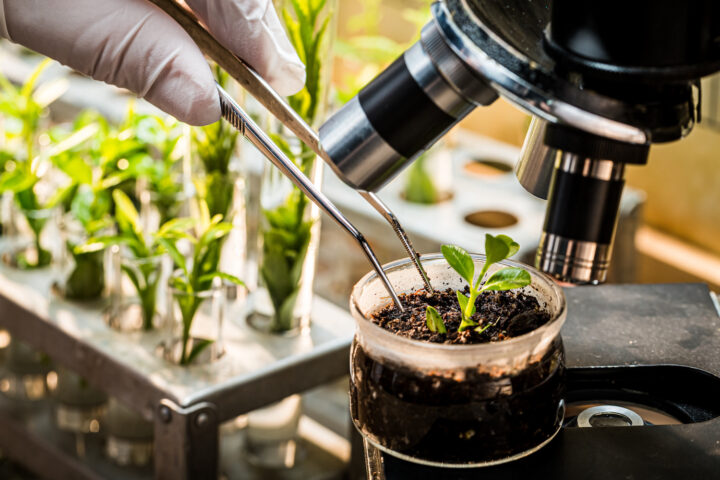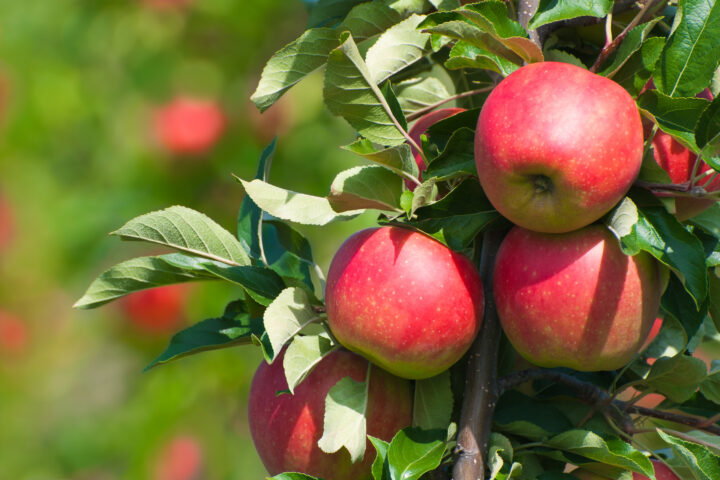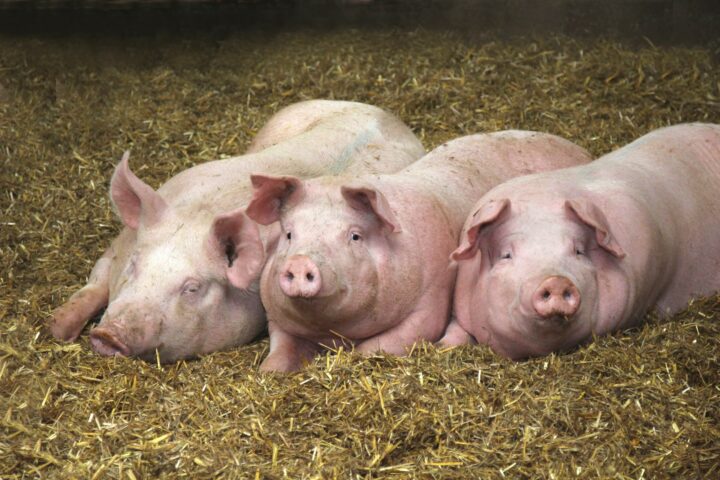
How NZT makes popular varieties more resilient
New breeding technologies offer solutions – but they are simply being ignored in the current debate. Anyone who complains about the lack of flavour in strawberries must also be prepared to accept modern methods such as genome editing.
Tuesday, May 13, 2025
Who doesn't love biting into a juicy strawberry on a warm spring day? The red fruits are in season between May and September. Regional strawberries are particularly popular. But when it comes to flavour, many varieties disappoint. What was once taken for granted – the aroma and taste of a real strawberry – has become rare. Yet consumers' demand for tasty fruit remains as strong as ever.
The NZZ newspaper has now also taken up the issue. In a recent article, the NZZ even refers to ‘red water bombs’. It blames decades of breeding for yield, shelf life and transportability. Taste has fallen by the wayside.
ETH biotechnologist Wilhelm Gruissem also confirms this trend in an interview with the Aargauer Zeitung newspaper: ‘Many fruits – especially berries such as strawberries, raspberries and blueberries – no longer have the taste I remember from my childhood.’ According to Gruissem, yield, shelf life and aroma are often closely linked genetically. If one of these is lost, the taste suffers. In the case of strawberries, around 30 per cent of genetic diversity has been lost.
Nevertheless, the red fruits still seem to find buyers: 7,000 tonnes of strawberries are harvested in Switzerland every year, with a further 16,000 tonnes imported, mainly from Spain. Demand remains high – but the quality is often disappointing.
It is not only genetics that plays a role here, but also the weather and the time of harvest. As Chantale Meyer from the Swiss Fruit Association explains to the Aargauer Zeitung newspaper, a wet spring or early harvesting can also impair the aroma. The advantage of domestic fruit is that it can be harvested when fully ripe – a clear advantage over imported produce, which is often picked unripe.
Mieze Schindler – the aromatic legacy
But they still exist, strawberries with flavour and a peculiar name: Mieze Schindler. Connoisseurs swear by this variety. They say it is the last strawberry that still tastes like strawberries.
It was bred over a hundred years ago by horticultural teacher Otto Schindler and named after his wife's nickname. Mieze tastes like a wild strawberry, only sweeter. This is thanks to the flavouring agent methyl anthranilate, which has almost completely disappeared from modern varieties.
Its disadvantage: it is extremely delicate – difficult to store, almost impossible to transport, susceptible to fungal diseases and moisture. It has no chance in shops. If you want to enjoy it, you have to grow it yourself.
The blind spot of the NZZ: genome editing
So far, so good – but what the NZZ article fails to mention is the obvious solution: genome editing. It is incomprehensible that an article about the dilemma of modern strawberry cultivation completely ignores this technology. Especially since genome editing is already being used – and addresses precisely where the problem lies. At least the AZ briefly mentions the CRISPR gene-editing tool. According to CRISPR expert Gruissem, the tool has already achieved a great deal with tomatoes: ‘In strawberries, the main component responsible for flavour is methyl anthranilate, which is also frequently used in perfumes.’
The Dutch company Hudson River Biotechnology (HRB) also recently announced that it had successfully grown strawberries from genome-edited single cells for the first time. This was made possible by the company's proprietary TiGER technology. Thanks to CRISPR, characteristics such as aroma, resistance and yield can be specifically influenced without inserting foreign DNA.
This is a breakthrough, especially for a genetically complex plant like the strawberry (which has eight sets of chromosomes). Traditional breeding is far too slow and inaccurate in this case.
The industry has been working on appropriate solutions for some time. The life science company Bayer, for example, is driving precision breeding in the fruit and vegetable sector. JD Rossouw, Head of Research at Bayer Crop Science, explains: ‘We have already established a strong foundation in precision breeding and are looking forward to applying our approaches to strawberries.’
Such further development would be particularly useful in the case of the Mieze Schindler variety. This is because its taste is unique and unrivalled. It is therefore not necessarily necessary to develop completely new varieties – the aim should rather be to improve proven varieties such as Mieze Schindler in a targeted manner, for example by making them more resistant to pests and moisture. This is exactly what genome editing makes possible – without changing the distinctive taste. The following quote from Rebbaukommissär Jürg Maurer sums it up: ‘A Merlot or Chasselas without fungal diseases would be better for me than a new (Piwi) variety.’
Allow technologies instead of complaining about poor taste
New breeding technologies are the key to sustainable agriculture. They can reduce the use of pesticides, increase yields and protect the environment – without compromising on taste. In a world with a growing population and dwindling resources, we need solutions like these.
Instead of continuing to complain that strawberries no longer taste good, we should finally allow new breeding technologies. The United Kingdom has already paved the way and passed a law that makes it easier to grow genome-edited plants. It is time for politicians in this country to move forward as well. Hopefully, the popular Mieze Schindler strawberry will one day be available in shops, much to the delight of local palates.
Kindly note:
We, a non-native editorial team value clear and faultless communication. At times we have to prioritize speed over perfection, utilizing tools, that are still learning.
We are deepL sorry for any observed stylistic or spelling errors.
Related articles

The United Kingdom paves the way for the cultivation of genome-edited plants
The British Parliament has passed a law that facilitates the cultivation of genome-edited plants.

Arguments for new breeding technologies
Plant breeding is complex. Accordingly, there are many questions in the discussion surrounding new breeding methods. swiss-food.ch has compiled the most important questions and answers on new breeding technologies.

New breeding methods – here to stay
The Swiss Parliament has decided to update the genetic engineering moratorium that has been in place since 2005. The step was overdue. On the occasion of a webinar organized by swiss-food.ch, experts from science and agriculture spoke about the benefits of new biotechnological breeding methods. It became clear: the risks are low, the opportunities are great.

What’s Really in Your Shopping Basket
Genetic engineering in our shopping basket? Yes – and much more often than we think. Whether it’s pasta, bread or vegetables: many of the everyday products we consume come from mutation breeding, which involves altering the genome and is considered safe. It’s high time to debunk the common myths.

Genomic breeding methods are not given a chance to prove themselves
Modern genomic breeding methods are legally classified as genetic engineering – and are therefore still effectively blocked. Yet we have been eating genetically modified plants for decades, just under the label of “classical mutagenesis.” The new, more precise techniques are regulated more strictly than the old ones, even though they are considered safer from a scientific perspective. A contradiction that urgently needs to be corrected. The EU is setting a good example.

No Pig Business: Why Testicle-Free Boars Are a Clear Win for Animal Welfare
New breeding methods are opening up new possibilities in both plant and animal breeding. They allow targeted genetic changes that can make animals more resilient, adaptable, and healthier.

Stagnation instead of progress: Switzerland risks falling behind in new breeding techniques
An overview article in Schweizer Bauer shows how much the new breeding methods are preoccupying farming circles. Once the consultation process on the federal law has been completed, a bill is expected – then it will become clear whether there is actually the political will to approve it.

